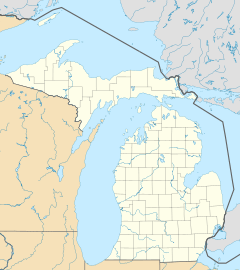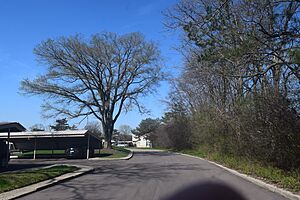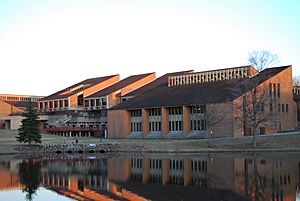Farmington Hills, Michigan facts for kids
Quick facts for kids
Farmington Hills, Michigan
|
|||
|---|---|---|---|
| City of Farmington Hills | |||
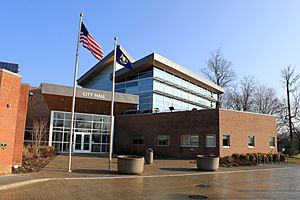
Farmington Hills City Hall in 2012
|
|||
|
|||
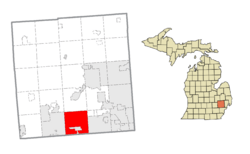
Location within Oakland County
|
|||
| Country | United States | ||
| State | Michigan | ||
| County | Oakland | ||
| Settled | 1824 | ||
| Organized | 1827 (township) | ||
| Incorporated | 1973 (city) | ||
| Government | |||
| • Type | Council–manager | ||
| Area | |||
| • City | 33.30 sq mi (86.24 km2) | ||
| • Land | 33.27 sq mi (86.16 km2) | ||
| • Water | 0.03 sq mi (0.07 km2) | ||
| Elevation | 860 ft (262 m) | ||
| Population
(2020)
|
|||
| • City | 83,986 | ||
| • Density | 2,524.53/sq mi (974.72/km2) | ||
| • Metro | 4,285,832 (Metro Detroit) | ||
| Time zone | UTC-5 (EST) | ||
| • Summer (DST) | UTC-4 (EDT) | ||
| ZIP code(s) |
48331, 48334–48336
|
||
| Area code(s) | 248 | ||
| FIPS code | 26-27440 | ||
| GNIS feature ID | 1616988 | ||
Farmington Hills is a city in Michigan, located in Oakland County. It's a suburb of Detroit, about 22 miles (35 km) from downtown. In 2020, about 83,986 people lived there, making it the second-biggest city in Oakland County.
Farmington Hills is known for being one of the safest cities in the United States and in Michigan. It was ranked the 30th safest city in the U.S. in 2010. In 2020, it was the 2nd safest city in Michigan. The city is also considered a wealthy area, ranking high for household income.
Even though they have separate services, Farmington Hills and the nearby city of Farmington are often seen as one community. They used to be part of the same township. The area has a newly updated downtown, unique shops, a classic movie theater, many restaurants, and public parks like Heritage Park. You can also find historical places such as the Longacre House and the Governor Warner Mansion. Both cities share the Farmington Public Schools and the Farmington Community Library.
Farmington Hills is home to the Holocaust Memorial Center. This is the only Holocaust memorial in Michigan. Its goal is to teach people about the terrible events of the Holocaust.
Contents
Geography and Location
Farmington Hills covers about 33.31 square miles (86.27 km²). Most of this is land, with a small amount of water. The city is surrounded by other towns: West Bloomfield to the north, Franklin and Southfield to the east, Livonia to the south, and Novi to the west.
History of Farmington Hills
The first white settler in the area was Arthur Power, a Quaker from New York. He bought land in 1823 and returned in 1824 with other families to start a settlement. This settlement was first called Quakertown.
A post office named Farmington opened in February 1826. The original post office building is still standing today and is a historical site. The area became Farmington Township in 1827. The settlement of Farmington became a village in 1866–67 and then a city in 1926.
A small community called Clarenceville also grew in the southeast part of the township. It was on the border with Livonia. This area still has the Clarenceville School District, which serves parts of Farmington Hills.
Other small post offices were set up over time, like East Farmington (1839–1842) and North Farmington (1847–1902).
Before Farmington Hills became a city, there were two small villages within the township: Quaker Valley Farms (which became the village of Quakertown in 1959) and Wood Creek Farms (a subdivision from 1937, incorporated as a village in 1957). In 1973, these villages and the rest of Farmington Township joined together to form the City of Farmington Hills. The city grew very quickly in the middle of the 20th century.
Economy and Major Companies
Farmington Hills is a hub for many important companies. It is home to the main offices of Gale (a publisher), Mango Languages, 5-Hour Energy, and The Sharper Image. It also hosts the U.S. headquarters for Bosch, Mercedes-Benz Financial Services, and TD Auto Finance.
Nissan's North American technical center is located here. This center works on engineering vehicle bodies for North and Latin America. It also has a lab for research, including hydrogen fuel cells. Nissan plans to add research on electric car batteries there too. In 2005, Nissan added a design studio to their Farmington Hills campus. The Nissan AZEAL was the first car designed there.
Other companies with offices in Farmington Hills include Hitachi Automotive Systems Americas, Inc., Panasonic Automotive Systems, and Lordstown Motors.
Here are some of the top employers in Farmington Hills:
| # | Employer | # of Employees |
|---|---|---|
| 1 | Beaumont Hospital | 2,500 |
| 2 | Robert Bosch Corporation | 1,400 |
| 3 | Nissan Technical Center North America | 1,200 |
| 4 | Hitachi | 1,200 |
| 5 | Farmington Public Schools | 1,100 |
| 6 | TRW Automotive Electronics | 650 |
| 7 | Mercedes-Benz Financial Services | 650 |
| 8 | Concentrix | 550 |
| 9 | Gale | 500 |
| 10 | Mahle | 500 |
Population and Demographics
| Historical population | |||
|---|---|---|---|
| Census | Pop. | %± | |
| 1980 | 58,056 | — | |
| 1990 | 74,611 | 28.5% | |
| 2000 | 82,111 | 10.1% | |
| 2010 | 79,740 | −2.9% | |
| 2020 | 83,986 | 5.3% | |
| 2018 Estimate | |||
In 2015, the average income for a household in Farmington Hills was $93,274. For families, it was $198,136. The city is known for its fancy homes and rolling hills. Forbes magazine listed it as one of the most successful suburbs in the U.S.
2020 Census Information
In 2020, there were 83,986 people living in Farmington Hills. There were 33,972 households. The population density was about 2,396 people per square mile (925 per km²).
The racial makeup of the city was:
- 62.7% White
- 19.9% Black or African American
- 0.4% Native American
- 14.1% Asian
- 2.4% from two or more races.
About 2.3% of the population was Hispanic or Latino.
2010 Census Information
In 2010, the city had 79,740 people and 33,559 households. About 29.1% of households had children under 18. The average age in the city was 42.1 years. About 21.5% of residents were under 18, and 15.9% were 65 or older.
In April 2013, Farmington Hills had the fourth-largest Japanese population in Michigan.
Education System
Most of Farmington Hills is served by the Farmington Public Schools district. This district has eight elementary schools, three middle schools, and one K-8 lottery school. Most of these schools are in Farmington Hills.
The city is home to North Farmington High School and Farmington Central High School. Farmington High School in nearby Farmington also serves parts of Farmington Hills. Harrison High School was in the city until 2019. It is now a community center called The Hawk.
Small parts of the city are also in the Clarenceville and Walled Lake Consolidated school districts. Farmington Hills also has Oakland Early College, which is a high school where students can earn college credits early.
There are several private schools in the area. These include two Catholic schools, Our Lady of Sorrows and St. Fabian. Mercy High School is an all-girls Catholic high school in Farmington Hills. There is also Concordia Lutheran School and Hillel Day School, a Jewish day school.
Colleges and Universities
The Orchard Ridge campus of Oakland Community College is located in Farmington Hills. The Michigan School of Psychology is also here.
Transportation Routes
Major roads in Farmington Hills include M-5, Orchard Lake Road, 12 Mile Road, 8 Mile Road, Northwestern Highway, I-696, and I-275. The city has several freeway exits that connect local roads to these interstates. Public transportation is provided by SMART.
Notable People from Farmington Hills
Many well-known people have lived in Farmington Hills, including:
- Jena Irene Asciutto, singer
- Steve Ballmer, former CEO of Microsoft
- Elizabeth Berkley, actress
- Manoj Bhargava, founder of 5-hour Energy
- Pam Dawber, actress
- Alex DeBrincat, NHL hockey player
- Colin Egglesfield, actor
- Sean Forbes Award Winning Deaf Musician
- Cam Fowler, NHL hockey player
- Devin Funchess, NFL wide receiver
- Tatiana Gutsu, Olympic champion gymnast
- Kirsten Haglund, Miss America 2008
- Arthur Hanlon, Latin musician
- Al Jean, writer/producer for The Simpsons
- Bill Joy, co-founder of Sun Microsystems
- Meg Mallon, professional golfer
- Jason Miller, rabbi and entrepreneur
- Jaime Ray Newman, actress
- Eren Ozker, puppeteer
- Austin Price, basketball player
- Cayden Primeau, NHL hockey goaltender
- Neal Rubin, columnist
- Barry Sanders, Hall of Fame football player
- Drew Stanton, retired NFL quarterback
- Tally Hall, indie rock band
- Fred Toucher, radio DJ
- James Wolk, actor
- Brian S. Eifler, military general
- Cory DeVante Williams, YouTuber
- Megan Keller, professional hockey player
See also
 In Spanish: Farmington Hills para niños
In Spanish: Farmington Hills para niños
 | Sharif Bey |
 | Hale Woodruff |
 | Richmond Barthé |
 | Purvis Young |



